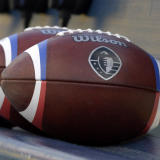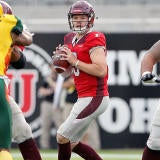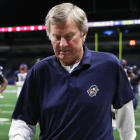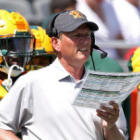Give the AAF this much: it shows you something new every week.
In many ways, this should be expected. A three-week-old football league can't be relied upon to give you anything consistently. But in that unpredictability we've actually learned the most about these eight teams. We've learned that Orlando is a favorite because it will find a way to win in the ways you least expect them to. We've learned that a team can take on an entirely new look based on nothing more than a quarterback switch. We've learned that teams change. They get better. They get worse.
Or, sometimes, they stay the same. Which in Atlanta's case is a bad thing. As we dive into the takeaways from Week 3 of the AAF season, let's start there, with the Legends.
Let's try to dissect the problems with Atlanta
With three weeks in the books, we're starting to see some growth around the Alliance, even amongst teams that have gotten off to slow starts. For example: Salt Lake suffered a quarterback injury in Week 1 and fell to 0-2, but then got a nice win against a familiar opponent at home. That's improvement. Another example: Memphis may be 0-3, but Zach Mettenberger looks like an answer at quarterback. Plus, the defense is playing at a higher level. That's improvement. (More on both of those teams below.)
At 0-3 following a 28-12 loss vs. Birmingham, the Legends have not been improving at the same rate. You could say they haven't been improving at all. Exactly why that's the case is a lengthy, complex answer, but it can boiled down to a few items.
First, they started the season behind the eight ball with coaching turnover. Head coach Brad Childress resigned, unexpectedly, in January. Then, earlier this month, prior to the start of the season, it was announced that offensive coordinator Michael Vick would not be joining the team in that capacity. Vick, who is also an NFL analyst for Fox, had prior engagements and was not around during training camp. The Legends curbed his absence by distributing his duties to different assistants, but ultimately they never established a way of doing things offensively. That shows up in a variety of ways -- play-calling, broadly speaking, but situational play-calling more specifically.
Granted, there's not much a play-caller can do about the fact that the offense, for instance, can't run the ball. There's nothing good about 43 yards rushing, though playing from behind hurts. However, red-zone opportunities were not lacking, and yet fell woefully short. The Legends had five trips to the red zone that equated to 12 points. On one trip in the fourth quarter, Atlanta faced a first-and-15, second-and-15, third-and-15 and fourth-and-15. On nearly every try, Atlanta chucked the ball into the end zone instead of trying to gain yards and make the situation more manageable (quarterback Matt Simms ended up taking a significant sack on fourth down). That's on the coaching staff.
But it isn't all their fault. Players need to execute, and on that very red-zone trip, Denard Robinson dropped what should have been a touchdown. For that matter, drops were a huge problem for Atlanta's wideouts all day.
Finishing was a problem, too. The Legends' first drive of the game was a lengthy one spanning more than nine minutes that moved the ball all the way down near the goal line -- and, yet, they could not convert. Simms had a wide open Bug Howard in the end zone on fourth-and-goal, but didn't get the ball to him soon enough. That goes down as a goal-line stand for the Iron, but the reality is the Legends had a chance to get an early touchdown.
Backs against the wall, @aafiron defense comes through with a huge stop. 💪#BHMvsATL pic.twitter.com/9K8CCsTqed
— The Alliance (@TheAAF) February 24, 2019
Moving the ball isn't always a problem for this offense -- Simms had more than 200 yards passing in the first half alone -- but finishing drives is absolutely an issue. Another red-zone trip resulted in Simms taking an unnecessary sack-fumble that forced the Legends to try for another field goal.
Safe to say that's not how the play was drawn up pic.twitter.com/d0JqUA8Ees
— Pick Six Podcast (@picksixpod) February 24, 2019
None of this is to say that Atlanta would have won today if it had executed better in the red zone. However, recall in Week 2 that the Legends were in a tight game with the San Diego Fleet before eventually losing 24-12. It'd be nice to say Atlanta has come close at times to pulling an upset, but that hasn't been the case. Now, nearly a month into the season, the Legends' offense is lacking an identity, and there's so much to fix you have to wonder if it's going to take the whole season. The drops are an issue, as is the offensive line. Simms isn't the core of the problem, but he has his shortcomings. There simply isn't much to work with in a league where points are at a premium.
Steve Spurrier continues to surprise
Leading the Express 9-0 Saturday night, but with his Sun-n-Gun offense stalling, Steve Spurrier told NFL Network during his halftime interview that he needed to start calling different plays. Boy, did he ever do so.
Quarterback Garrett Gilbert started hot, completing his first six passes, but started to cool as Memphis' defense tightened up; however, Gilbert was missing open receivers as well, and it was clear the Apollos needed an adjustment. As the third quarter began, enter Garrett Gilbert: noted dual-threat quarterback.
Despite being known more as a pocket passer, Gilbert has always had underrated athleticism. He was a capable dual-threat player a decade ago coming out of Lake Travis High School in Austin, Texas. Against the Express, Spurrier used his quarterback in some option and zone-read looks for which the defense wasn't ready. The end result? Seven carries for Gilbert and 43 yards, including an impressive 21-yard keeper for a touchdown.
To the house ‼️
— Orlando Apollos (@aafAPOLLOS) February 24, 2019
🏹#TakeAim | #MEMvsORL pic.twitter.com/3XAywPPEPV
Spurrier saw that Gilbert was struggling with his throws, so he did what no one expected him to: he made Gilbert a runner. That's great coaching, and it's why the Apollos are 3-0.
Stallions turning a corner?
Entering Week 3, Salt Lake City felt more dangerous than an 0-2 would normally feel. When oddsmakers put them as a mere 4.5-point dog at home against the Hotshots -- a team they've already faced -- Saturday's game seemed like it was ripe for an upset alert. (FYI, ya boy had Arizona -4.5 like a fool.) Sure enough, the Stallions, with quarterback Josh Woodrum healthy again, came away with the first non-chalk victory of the season -- 23-15 over the Hotshots.
Salt Lake has some nice pieces to get the season turned in the right direction: a strong running game, good offensive line play and a stout defensive front. Now that Woodrum is healthy again, the Stallions can string together some more victories. Up next, though, will be a home game against Orlando, the AAF's best team.
If nothing else, Memphis is more fun with Mettenberger
Memphis is 0-3. And 0-3 is 0-3 no matter how you try to spin it. But with Zach Mettenberger at quarterback, the Express are at least fun to watch. Mettenberger came off the bench to start the second half of a 21-17 loss to the Apollos, when it was clear the offense could no longer continue with Christian Hackenberg, who had two first-half picks and nearly threw a third. Immediately, Mettenberger made an impact by leading a nine-play, 75-yard touchdown drive capped off with this beautiful 30-yard dime.
On today's episode of The Mett Show... pic.twitter.com/4KpL6faWcj
— Memphis Express (@aafexpress) February 24, 2019
He wasn't done. Down 21-9 in the fourth quarter, Mettenberger outdid himself with a clutch 40-yard scoring pass that showed his excellent movement in the pocket, patience and a huge arm. What's more? Both touchdowns came on third downs, with the latter coming on a whopping third-and-19.
3rd and 19? That ain't a problem. | #AllAboard pic.twitter.com/4Slu58gfy3
— Memphis Express (@aafexpress) February 24, 2019
For whatever reason, Mettenberger wasn't the Week 1 starter ... or the Week 2 starter ... despite Hackenberg's obvious struggles. But sometimes players perform better under the bright lights than they do in practice. Obviously, Mettenberger should start in Week 4. It'll be interesting to see if he can repeat his surprising debut (9-of-12 for 120 yards and 2 TDs), but it's clear this team is improving. The AAF's worst passing offense suddenly was able to stretch the field -- or, at least, be a threat to stretch it. And if you're going to score fewer than 12 points per game, you may as well make it fun as hell.
The Fleet have found their footing
Since dropping their Week 1 game to San Antonio 15-6, the Fleet have won their past two games, including a Sunday rematch against the Commanders, by a combined score of 55-23. Granted, one of those victories came against the Legends, which, as mentioned above, look like the worst team in the AAF by a country mile. Still, credit coach Mike Martz for doing what he does best -- getting the offense going. The switch to Phillip Nelson at quarterback is paying off (Nelson was 17-of-25 for 193 yards, 2 TDs and 1 INT vs. San Antonio) and the Fleet have started to find more weapons around him, including Ja'Quan Gardner, whose 83-yard touchdown run against the Commanders is on record for being the longest in the Alliance's short history. Gardner finished the game with 122 yards.
HE. IS. GONE. 83 yards, touchdown @aaffleet!@_JGWentworth_32 | #SAvsSD pic.twitter.com/l5zXlxalCE
— The Alliance (@TheAAF) February 25, 2019
In case you were wondering, @_JGWentworth_32's 83-yard touchdown run in the third quarter was the longest TD from scrimmage in @TheAAF's history.
— SDFleetBeat (@SDFleetBeat) February 25, 2019
While the Fleet won't conjure up tons of memories of Martz's "Greatest Show on Turf" days, the fact that this unit looks so different in just a couple of weeks is an encouraging sign. On top of that, the defense continues to get the job done with a disruptive front seven. Linebacker A.J. Tarpley, whose journey from the NFL to Wall Street and back to the AAF is remarkable, did his part with a pick-six. With Arizona losing on Saturday, you can certainly argue that the Fleet have played like the top team in the West Division since their slow start out of the gate. Next week's road game at Memphis suddenly has more intrigue than it originally did.
Player of the Week
Birmingham Iron CB Jamar Summers: There are already a handful of players who are performing like they belong on an NFL roster in 2019. Summers is one of them. The outstanding shutdown corner had four pass deflections, one interception and three tackles during Birmingham's win over the Legends. He's been legit in all three games as well, recording seven passes defended and two interceptions overall.
















